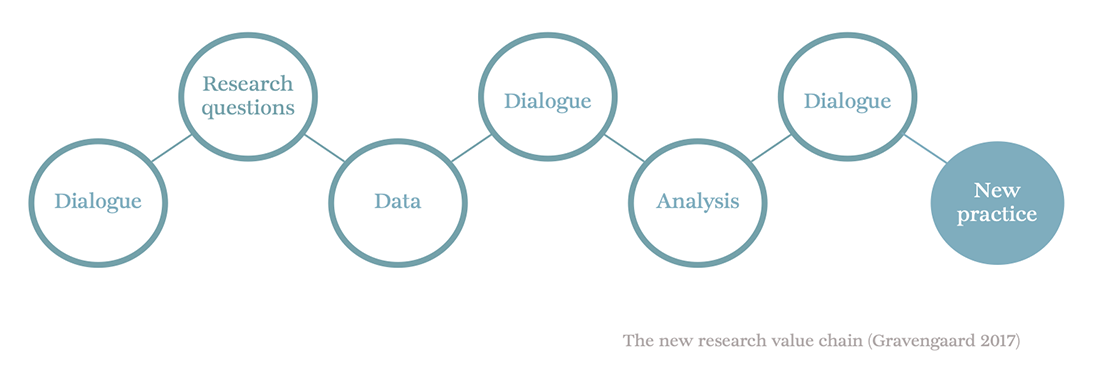The Future Communications Advisor
In our everchanging and complex world, effective communication becomes more and more important for all types of organisations and leaders. Consequently, the role of the communications advisor has never been more important. This research project investigates the practice, mindset and competence profile of the effective and efficient communications advisor and thus aims at improving both research and practice within communication and communication advising.

This research project aims to be able to answer these three research questions:
- What is effective and efficient communication advising?
- What does this look like in practice? That is: How do effective and efficient communications advisors behave and act in their professional practice in organisations?
- How do we educate and train students and newcomers to become effective and efficient communications advisors?
This research project gathers communication researchers from several universities, communication practitioners from a range of organisations and communication students from all levels. The collaboration between these parties is structured as ‘co-creation for research’ and is thus a rather new way of collaborating and creating knowledge compared to that what is usually seen in research. The aim is to integrate knowledge and experience from both the field of research and the fields of practice and education.
The Future Communications Advisor is a broad research project with a range of sub projects:
-
CEO communication and the future communications advisor
This research project will improve our understanding of CEO communication and of which characteristics will be most essential for future communications advisors working with top management. We co-create the research project with top managers and experienced communication advisors to top management.Read more here: www.ceocommunication.dk.
- Think aloud protocols – a valuable tool for the communications advisor
This project is co-created with communications advisors and organisations aiming to improve their communication. By asking respondents to think aloud while reading various communication products, we aim to further discuss and develop the method ‘think aloud protocols’ – both theoretically and practically.Read research articles: Tænke højt-protokoller: En metode til at undersøge modtageres tekst forståelse og -oplevelse and Danske Studier 2019 (pp. 74-116).
- Co-creation for research
In this research project we apply a system of co-creation for research, through which we aim to actively collaborate with practitioners and students.In order to co-create new knowledge and expand our understandings together. Our aim is to further analyse and develop this method and develop processes for ‘the new research value chain’.
Read more about the co-creation process with students: Den læsegruppe, du altid ønskede at være med i! and about the co-creation process with communications advisors: Samarbejde mellem bureau og forsker skaber viden om underbelyst disciplin.
- Research integration in university teaching
Based on a university grant, we have experimented with integrating research in the university course ‘The communications advisor and her professional roles’ (Man kan linke til siden på kurser.ku.dk). During this course, all students create their own research projects based on their individual interests, and these projects become important parts of the larger research project ‘The Future Communications Advisor´.Furthermore, we work extensively on integrating our research results in university courses as well as workshops with and education of communication practitioners.
- Internship periods – socialization and learning processes
Taking our point of departure from a broad variety of qualitative data, we study communications students and their internship periods asking questions such as: How can we describe and improve socialization and learning processes during internship periods? How can we enhance the learning environment? How can we create the most effective and effective internship periods – benefitting both interns and organisations respectively?
The Future Communications Advisor is based on both qualitative and quantitative data:
- Interviews with communications advisors from a range of industries as well as top managers
- Participant observation following communications advisors during their everyday professional practice
- Focus groups with communications advisors
- Workshops with communications advisors
- Surveys sent to a variety of communications advisors
This gives us the opportunity to produce both thick and detailed descriptions of practice and ways of thinking and acting among communications advisors – and at the same time, our surveys provide us with the opportunity to create more generalized knowledge.
Using ‘the co-creation for research’ approach in all projects, our goal is to establish a knowledge-creating relationship where both practitioners, students and researchers are engaged in a joint endeavour to identify, analyze and develop solutions for relevant real-world problems and dilemmas.
We do this by involving practitioners and students in ‘the new research value chain’ where both researchers, practitioners, and students employ their respective knowledge when discussing research questions, data, analyses and future practices during workshops and meetings.

Read more about co-creation for research: Studerende, forskere og kommunikationsfolk bag nyt forskningsprojekt.
As we use the ‘co-creation for research’ approach, both practitioners, researchers and students are continuously involved in this research project – both when defining research questions, collecting data, analysing data, discussing findings, and developing best practice. We term this: the new research value chain as practitioners are involved throughout the entire research process and not only receivers of research-based knowledge as we know it from the more traditional research value chain.
The co-creation process takes place in more formalized partnerships and collaborations with external partners as well as in more informal discussions and workshops with practitioners and others. These. Collaborations and networks. Entails a strong tie between the research project and professional practitioners as well as the educational environment at the university.
We also engage in a variety of more traditional research communication activities towards a broader audience outside academia as we publish articles and white papers , create workshops and panels, use SoMe, write books etc.
Furthermore, our annual November conference – The Communications Advisor of the Future – at the university of Copenhagen gathers approximately 300 communications researchers, communications advisors and communication students each year providing a forum for joint discussions, inspiration and co-creation of new knowledge on the practice of the competent communications advisor of the future.
Researchers
Internal researchers
| Name | Title | Phone |
|---|
External researchers
Ann Bager, Associate Professor, SDU.
Marianne Wolf Lundholdt, Associate Professor, SDU.
Malene Kjær, Aalborg University.
External partners
Anders Monrad Rendtorff, Associate Partner, RelationsPeople.
Kristian Eiberg, Managing director, Partner, RelationsPeople.
Anne Kjærgaard, Senior advisor, SKAT.
Partners
Some of the sub projects and conferences are conducted in close partnership with external partners.


